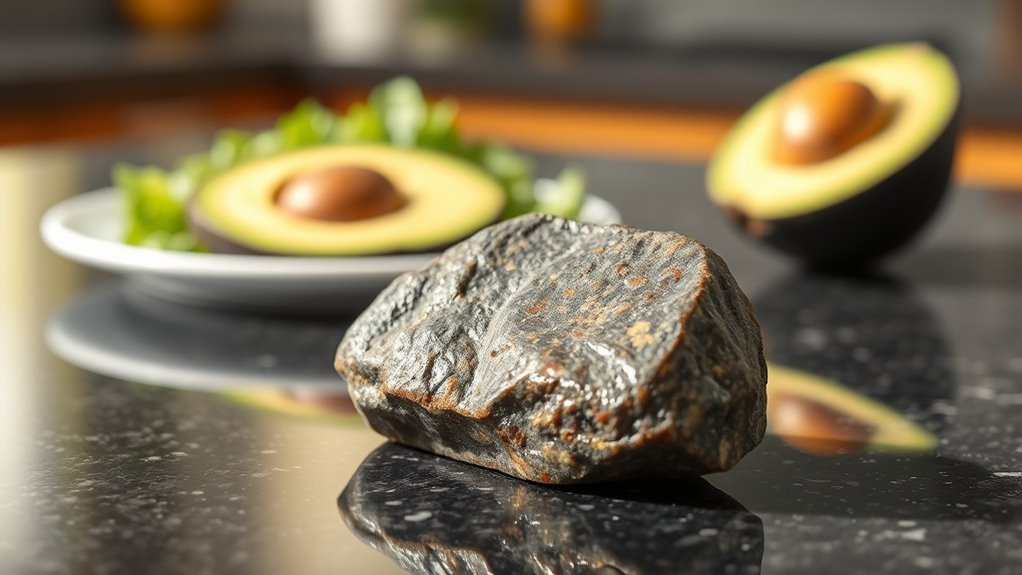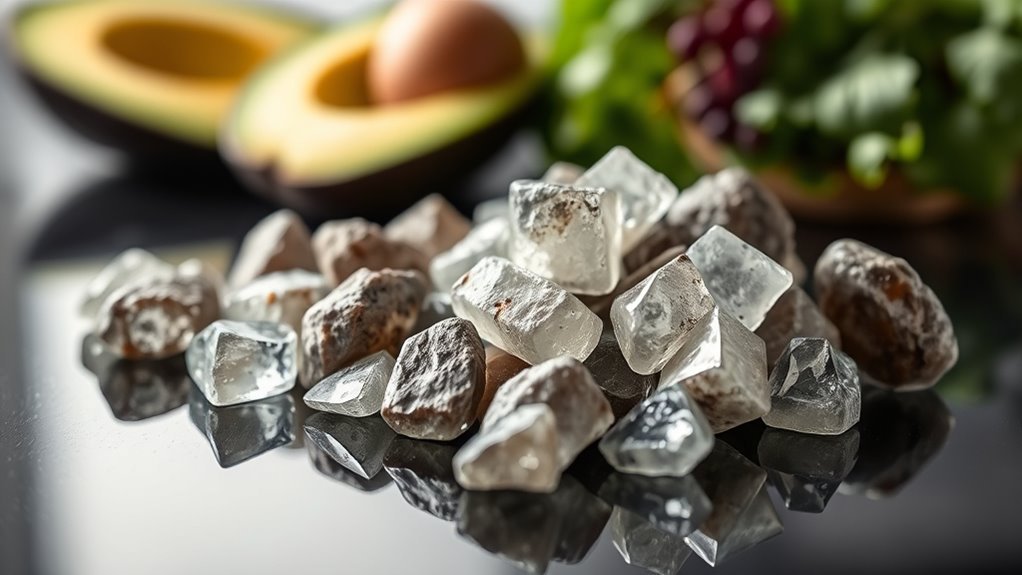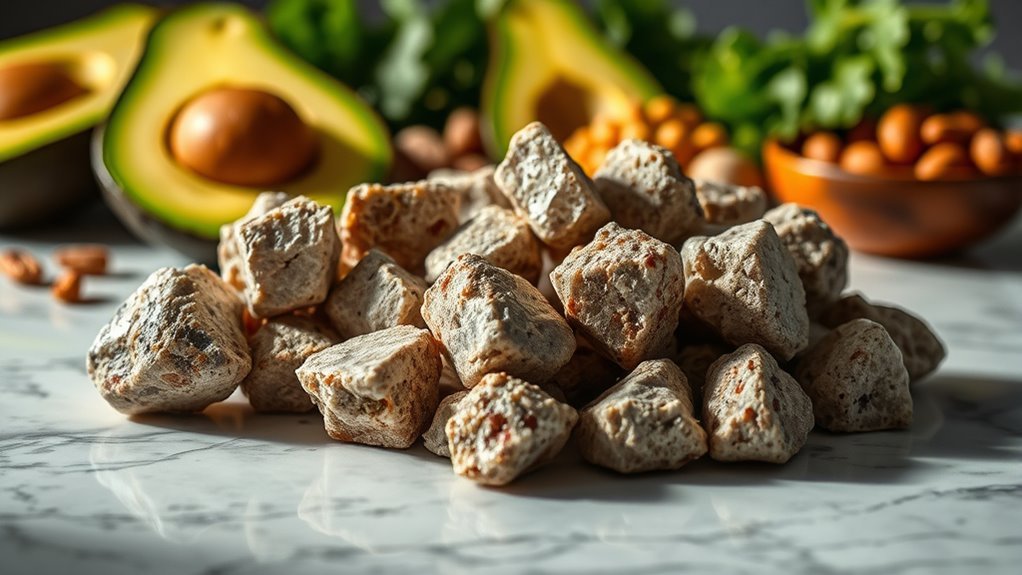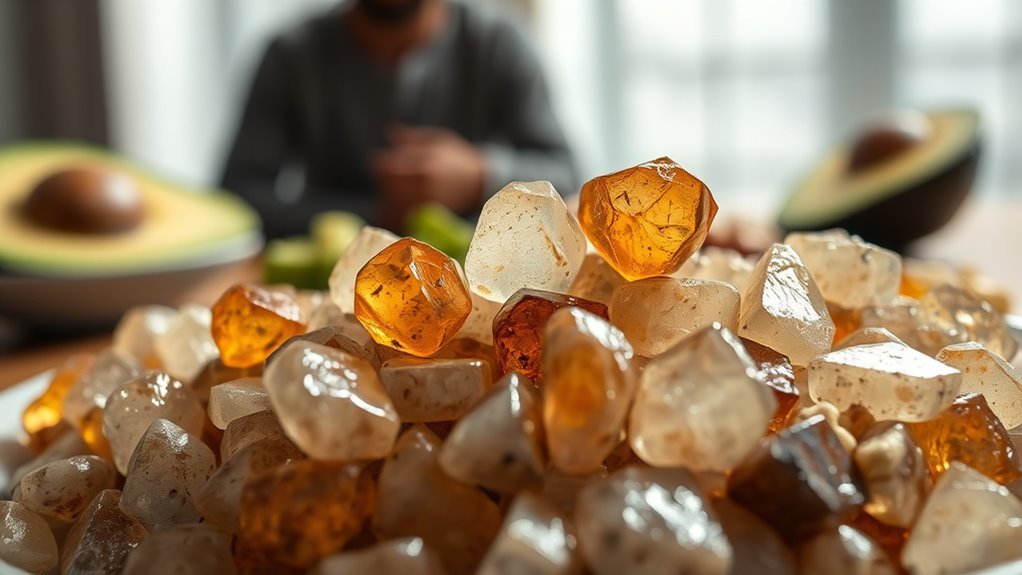Yes, the keto diet can increase your risk of kidney stones. Its high protein intake may elevate uric acid levels, while dehydration can strain your kidneys. Additionally, the diet may impact calcium and magnesium levels, further raising the likelihood of stone formation. It’s vital to stay hydrated and make mindful food choices to help mitigate these risks. By understanding these factors, you can make healthier decisions for your kidney health. There’s more to explore about this topic.
Understanding Kidney Stones: Types and Causes

Kidney stones, often described as painful and troublesome, are hard deposits formed in the kidneys from minerals and salts. There are several types of stones, including calcium oxalate, uric acid, struvite, and cystine stones. Each type has distinct causes of formation. Calcium oxalate stones, for instance, can arise from high oxalate intake or low calcium levels, while uric acid stones may form due to dehydration or a diet rich in purines. Struvite stones are often linked to urinary tract infections, and cystine stones can occur in individuals with a genetic disorder that affects cystine absorption. Understanding these types and their causes can empower you to make informed choices about your health, potentially reducing your risk of developing kidney stones.
The Keto Diet Explained: Key Principles and Components

The ketogenic diet, often referred to as the keto diet, focuses on drastically reducing carbohydrate intake while increasing fat consumption. This approach shifts your body into a state called ketosis, where it burns fat for fuel instead of carbohydrates. Typically, macronutrient ratios in the keto diet are around 70-75% fat, 20-25% protein, and only about 5-10% carbohydrates. This low-carb, high-fat model can lead to several ketosis benefits, including weight loss, improved energy levels, and enhanced mental clarity. As you embrace this dietary lifestyle, you’ll find that the freedom to enjoy various high-fat foods can be liberating while potentially offering health advantages. Just remember, it’s crucial to balance your nutrients and stay hydrated for overall well-being.
Potential Risks of Keto Diet on Kidney Health

While the keto diet offers various potential health benefits, it’s important to evaluate its impact on kidney health. One concern is how the diet, high in fats and low in carbohydrates, can affect kidney function. The increased protein intake often associated with keto may lead to elevated uric acid levels, which can contribute to kidney stones. Additionally, dehydration from the diet’s diuretic effect can further strain your kidneys. Studies indicate that keto impacts your body’s calcium and magnesium levels, potentially increasing the risk of stone formation. If you have pre-existing kidney conditions or a history of stones, it’s essential to consult a healthcare professional before starting the diet. Awareness of these risks can help you make informed choices about your health.
Nutritional Considerations for Preventing Kidney Stones on Keto
To prevent kidney stones while following a keto diet, it’s important to focus on your nutritional choices. First, prioritize hydration strategies. Aim for at least 2-3 liters of water daily to dilute your urine and lower stone formation risks. Next, consider your food choices carefully. Incorporate potassium-rich foods like avocados and leafy greens, which can help balance minerals. Limit oxalate-rich foods such as spinach and almonds, as these can contribute to stone formation. Make sure you’re getting adequate magnesium and calcium, as they can also play a protective role. By making mindful decisions about your hydration and food intake, you can enjoy the benefits of a keto diet while minimizing the risk of kidney stones.
Tips for Maintaining Kidney Health While Following a Keto Diet
Maintaining kidney health on a keto diet requires a proactive approach to both diet and lifestyle. Start with hydration strategies; aim for at least 2-3 liters of water daily to help flush out toxins and prevent stone formation. Incorporate electrolyte-rich foods like avocados and leafy greens to balance your intake, as keto can lead to imbalances.
When making food choices, opt for low-oxalate options, such as zucchini and cauliflower, to minimize kidney stone risk. Also, consider including healthy fats, like olive oil and nuts, but watch portion sizes. Finally, regular check-ups with your healthcare provider can help monitor your kidney function, ensuring you enjoy the benefits of keto without compromising your health.
Frequently Asked Questions about Keto Diet and Kidney Stones
1. Can the keto diet increase the risk of kidney stones?
Yes, the keto diet can potentially increase the risk of developing kidney stones. This is primarily due to the high intake of dietary fats and low intake of carbohydrates, which may lead to changes in urine composition. Higher levels of certain substances like oxalate, which is found in many keto-friendly foods, can contribute to the formation of kidney stones.
2. What types of kidney stones are associated with the keto diet?
The most common type of kidney stones associated with the keto diet are calcium oxalate stones. The ketogenic diet includes foods that are high in oxalate, such as spinach, nuts, and certain berries. As the body metabolizes fats and reduces carbohydrate intake, the balance of minerals and compounds in urine may shift, promoting these types of stones.
3. How can I reduce the risk of kidney stones while on a keto diet?
To reduce the risk of kidney stones while following a keto diet, consider the following tips:
- Stay well-hydrated by drinking plenty of water throughout the day.
- Monitor your intake of high-oxalate foods and consider balancing them with calcium-rich foods to help bind the oxalate.
- Limit excessive protein intake, as high protein levels can increase the risk of stone formation.
- Consult with a healthcare professional or a registered dietitian for personalized dietary advice.
4. Are there any symptoms of kidney stones I should watch for?
Yes, symptoms of kidney stones can include severe pain in the back or side, pain during urination, blood in the urine, and frequent urge to urinate. If you experience any of these symptoms, it’s important to seek medical attention promptly, as kidney stones can lead to serious complications if not treated.
5. Should I avoid the keto diet if I have a history of kidney stones?
If you have a history of kidney stones, it is advisable to consult with a healthcare professional before starting the keto diet. They can help assess your individual risk factors and suggest modifications to the diet that may help minimize the risk of stone formation while still allowing you to achieve your health goals.
References
- https://www.ncbi.nlm.nih.gov/pmc/articles/PMC7070894/
- https://www.health.harvard.edu/staying-healthy/the-keto-diet-and-your-kidneys
- https://www.kidney.org/atoz/content/kidneystones
- https://www.webmd.com/diet/ss/slideshow-keto-diet
- https://www.mayoclinic.org/healthy-lifestyle/nutrition-and-healthy-eating/expert-answers/keto-diet-and-kidney-health/faq-20475364
- https://www.sciencedirect.com/science/article/abs/pii/S0899900719303678
- https://www.cdc.gov/healthyweight/assessing/bmi/adult_bmi/english_bmi_calculator/bmi_calculator.html


